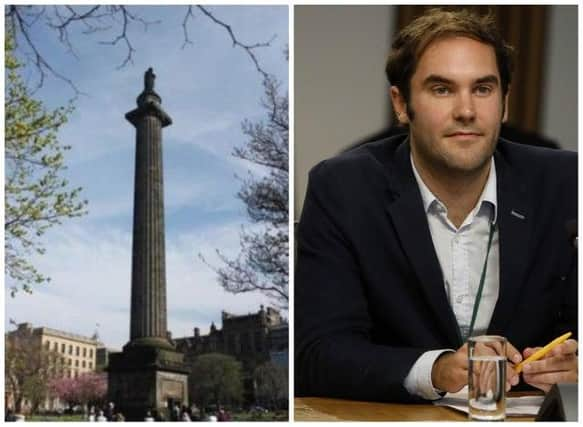Edinburgh Council leader Adam McVey says city's look back at slavery links 'doesn't end' with Dundas plaque


The leader of Edinburgh City Council Adam McVey has responded to calls to remove the Melville Monument, a statue in the city dedicated to Henry Dundas who had a prominent role in the slave trade.
Cllr Adam McVey discussed how the Capital should mark Scots who were responsible for and built their wealth on the slave trade on BBC’s Good Morning Scotland today after Black Lives Matter protest graffiti appeared on the Melville statue in St Andrew Square which commemorates Henry Dundas.
Advertisement
Hide AdAdvertisement
Hide AdHe announced yesterday that a plaque will be added to the monument detailing Henry Dundas’ ties to the slave trade following a meeting with Edinburgh World Heritage, Professor Geoff Palmer and an expert from Edinburgh University.
The council leader is hopeful that details on the plaque will be signed off quickly and the city will be able to tell an ‘accurate and more reflective’ story of the Capital’s history.
However, Cllr McVey stressed that the Dundas Statue is just ‘one instance’ of change.
He said: “Edinburgh’s street names and buildings are littered with the history of the good and the bad of how that wealth was created in our city, so this process, this engagement, this effort doesn’t end with a plaque at the Dundas Statue it will have to be a story that we continue to tell about our city and our city in the wider sense.
Advertisement
Hide AdAdvertisement
Hide Ad“I’d very much hope today to find the formal words that we can progress with, we’ve secured a virtual agreement with the owners of the statue that will go in as soon as possible so, assuming that we can get to a point today that that’s signed off we’ll move forward very quickly indeed to bring that to a conclusion.”
The council has been debating how to highlight Dundas’ ties to slavery for over two years, with a plaque originally planned to be erected by no later than September 2018, however, this had not been completed due to an expert group being unable to decide on wording.
Speaking on GMS, Cllr McVey added: “It’s really important in that that we don’t frame contribution of black and ethnic minority people to our city as through a prism of slave trade.
“We need to celebrate the contribution that black and ethnic minority people have made to our city's development in our city’s progress in our city’s success, and continue to make to that success today.
Advertisement
Hide AdAdvertisement
Hide Ad“There is not enough diversity in the statue landscape of our city but in the here and now what’s important is our behaviour, how we react, how we interact with each other when you’re hearing the stories – and we heard some powerful ones at the protests at the weekend – the words that keep on coming up time and time again which I think should all give us pause for thought are ‘every day’.
“When black and ethnic minority people are describing their experience of microaggressions, of decisions that they make, of their own awareness, of their own race, the words that they are using to describe those experiences are ‘every day’ and I think we have to acknowledge that.
“We have to call it out, it’s not good enough to not be a racist. If you see racial abuse on a bus – intervene, if you see the security guard of a supermarket getting racially abused step forward and offer to be a witness.
“This is incumbent upon all of us to tackle right now it's not just about the statues and street names of our street, it's about the people who are living in our city right now knowing that every single person in Edinburgh and beyond stands with them and not with a tiny minority of people who think otherwise.”
Advertisement
Hide AdAdvertisement
Hide AdHenry Dundas, the first Viscount Melville, who as first lord of the admiralty, deliberately prolonged slavery to protect the elite in the 1800s – forcing about 630,000 slaves to wait more than a decade for their freedom.
Comment Guidelines
National World encourages reader discussion on our stories. User feedback, insights and back-and-forth exchanges add a rich layer of context to reporting. Please review our Community Guidelines before commenting.